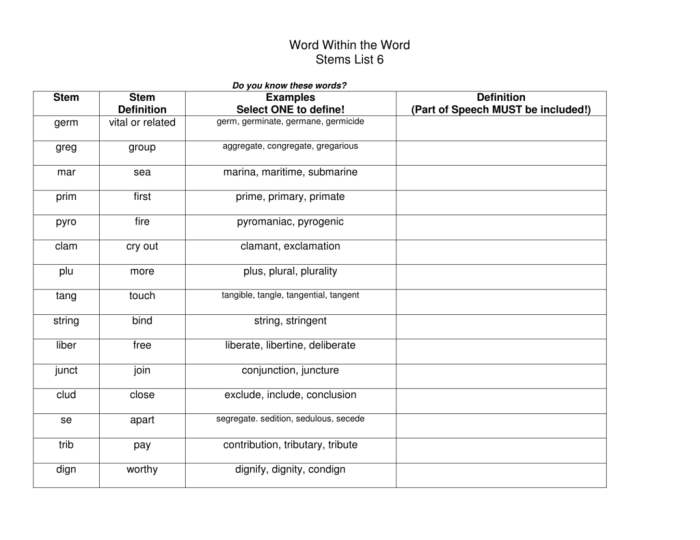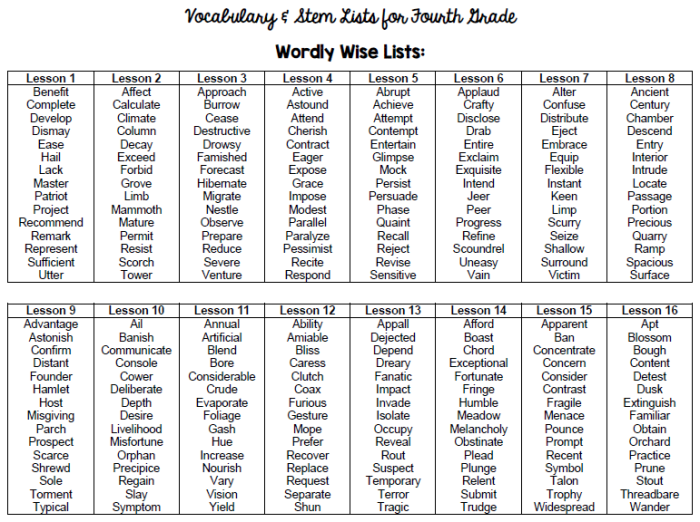Words with the stem voc – Step into the captivating realm of words with the stem “voc,” where language takes on a life of its own, revealing intricate connections and a rich tapestry of meaning. From the Latin root meaning “voice” to its echoes in languages across the globe, “voc” stem words paint a vivid portrait of sound, expression, and the power of human communication.
Delve into the diverse semantic categories associated with “voc” stem words, exploring words that resonate with the voice, evoke the symphony of sound, and summon the act of calling. Discover the fascinating phonological variations that shape pronunciation and spelling, and unravel the morphological patterns that govern the formation of new words.
Etymology and Origin

The Latin root “voc” means “to call” or “to summon.” It is found in many English words related to the act of speaking or calling out.
Here are some examples of words derived from “voc” in various languages:
Latin
- vocare (to call)
- vox (voice)
English
- vocal
- vociferate
- vocation
French
- voix (voice)
- voilà (behold)
Spanish
- voz (voice)
- vocación (vocation)
Semantic Range of “Voc” Stem Words

Words with the “voc” stem encompass a diverse range of semantic categories, primarily revolving around the concepts of voice, sound, and calling.
Voice and Sound
Many “voc” stem words are associated with the production and perception of sound. These include terms such as:
- Vocal: Relating to the voice or its use in producing sound.
- Vocation: A calling or occupation that involves the use of the voice, such as singing or teaching.
- Vociferous: Making a loud or noisy sound.
- Vocabulary: A set of words known and used by a person or group.
- Invoke: To call upon or summon, often through the use of words or sound.
Calling and Summoning
Another semantic category associated with “voc” stem words is the notion of calling or summoning. This includes terms such as:
- Vocate: To call or summon, especially in a formal or official manner.
- Advocate: A person who speaks or writes in support of a cause or person.
- Provocative: Intended to provoke or stir up a reaction.
- Equivocate: To speak or act in an ambiguous or evasive manner, often to avoid committing to a clear position.
Phonological Variations
The “voc” stem exhibits various phonological variations across languages, influencing both pronunciation and spelling.
One common variation involves the addition or omission of a vowel sound between the “v” and “c.” In some languages, such as Latin, the “v” is followed by a short “o,” resulting in the pronunciation “vok.” In contrast, other languages, like English, omit the vowel, leading to the pronunciation “vok.”
Vowel Variations
- Latin: “vok” (with a short “o” between “v” and “c”)
- English: “vok” (without a vowel between “v” and “c”)
Another variation occurs in the pronunciation of the “c.” In certain languages, the “c” is pronounced with a hard “k” sound, as in “vocation.” In other languages, it is pronounced with a softer “s” sound, as in “vocal.”
Some words have the stem voc, like vocation and vocal. If you’re ever in France, you might hear the term ” mrs in france for short “. Don’t be surprised, it’s just a fun way to say “madame” or “mademoiselle”.
Getting back to words with the stem voc, they often have to do with speaking or calling out.
Consonant Variations
- Hard “k” sound: “vocation”
- Soft “s” sound: “vocal”
These phonological variations not only affect the pronunciation of “voc” stem words but also their spelling in different languages. For instance, the Latin word “vox” (voice) is spelled “voice” in English, reflecting the omission of the vowel between “v” and “c.”
Morphological Patterns
The morphological patterns of “voc” stem words involve the attachment of prefixes, suffixes, and inflections to form new words with varying meanings and functions.
Prefixes
Prefixes that can be attached to “voc” include:
- in-: Indicates “into” or “within”
- con-: Indicates “together” or “with”
- re-: Indicates “again” or “back”
- e-: Indicates “out” or “away”
Suffixes
Suffixes that can be attached to “voc” include:
- -able: Indicates “able to be” or “capable of”
- -ation: Indicates “the act or process of”
- -al: Indicates “relating to” or “characteristic of”
- -ive: Indicates “having the quality of” or “tending to”
Inflections, Words with the stem voc
Inflections that can be attached to “voc” include:
- -s: Indicates the third person singular present tense
- -ed: Indicates the past tense or past participle
- -ing: Indicates the present participle
Cultural and Historical Influences

The development and usage of “voc” stem words have been significantly influenced by cultural and historical factors. These words have been employed in various cultural contexts, including literature, art, and music.
Literature
- Poetry:“Voc” stem words have been used in poetry to evoke emotions and convey deep meanings. For instance, the word “vocation” appears in William Wordsworth’s poem “Ode: Intimations of Immortality,” where it refers to the innate calling or purpose in life.
- Novels:In novels, “voc” stem words have been employed to explore themes of identity, belonging, and purpose. For example, the novel “The Vocation of Edward Lear” by Thomas Keneally examines the life of a famous artist and his struggles with his calling.
Art
- Paintings:“Voc” stem words have been incorporated into paintings to convey symbolic meanings. In Vincent van Gogh’s painting “The Starry Night,” the swirling sky evokes a sense of the divine and the transcendent, reflecting the artist’s spiritual beliefs.
- Sculptures:Sculptures have also employed “voc” stem words to represent abstract concepts. For instance, the sculpture “The Vocation of Moses” by Michelangelo depicts the biblical story of Moses’ calling to lead the Israelites out of Egypt.
Music
- Classical music:“Voc” stem words have been used in classical music to express themes of love, loss, and longing. For example, the opera “La Traviata” by Giuseppe Verdi features the aria “Voi che sapete,” which explores the emotional turmoil of a courtesan who falls in love.
- Popular music:In popular music, “voc” stem words have been employed to convey personal experiences and emotions. For instance, the song “Voces” by Coldplay features the lyrics “We are the voices in the wind,” representing the collective voices of those who feel marginalized or unheard.
Applications in Linguistics and Language Learning: Words With The Stem Voc

The study of “voc” stem words provides valuable insights into the structure and evolution of language. By examining the patterns and relationships among these words, linguists can gain a deeper understanding of how languages develop and change over time.
Etymology and Origin
The etymology and origin of “voc” stem words offer clues about the historical development of languages. For example, the English word “vocabulary” comes from the Latin “vocabulum,” which means “word.” This connection suggests that the concept of a vocabulary, or a collection of words, has been a fundamental aspect of language for centuries.
Semantic Range of “Voc” Stem Words
The semantic range of “voc” stem words reveals the diverse ways in which these words are used to express different concepts related to language and communication. From “vocal” to “vocation,” these words encompass a wide range of meanings, reflecting the multifaceted nature of language itself.
Phonological Variations
The phonological variations of “voc” stem words demonstrate the influence of sound changes on language evolution. For example, the English word “voice” is derived from the Latin “vox,” but the pronunciation has changed over time due to sound shifts. These variations provide evidence for the dynamic nature of language and the ways in which sounds can evolve over time.
Morphological Patterns
The morphological patterns of “voc” stem words reveal the rules and conventions that govern word formation in different languages. For example, the suffix “-tion” is commonly used to form nouns from verbs, as seen in the word “vocation.” These patterns provide insights into the structure and organization of language systems.
Cultural and Historical Influences
The cultural and historical influences on “voc” stem words reflect the ways in which language is shaped by social and cultural factors. For example, the English word “vocabulary” has been influenced by the Latin language, which was the language of education and scholarship in Europe for centuries.
These influences provide a glimpse into the interconnectedness of language and culture.
FAQ
What is the origin of the “voc” stem?
The “voc” stem traces its roots to the Latin word “vox,” meaning “voice.”
How are “voc” stem words used in different languages?
Words with the “voc” stem appear in various languages, including English (“vocal”), French (“voix”), and Spanish (“voz”).
What are some examples of words with the “voc” stem?
Examples include “vocal,” “vocation,” “vocabulary,” and “advocate.”